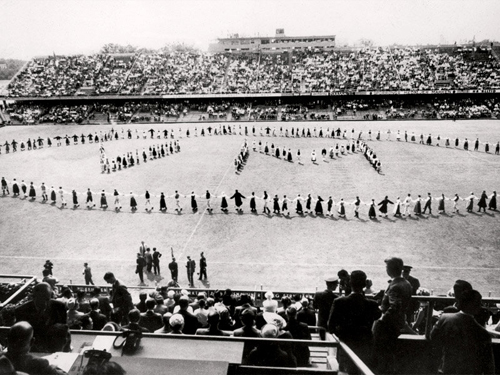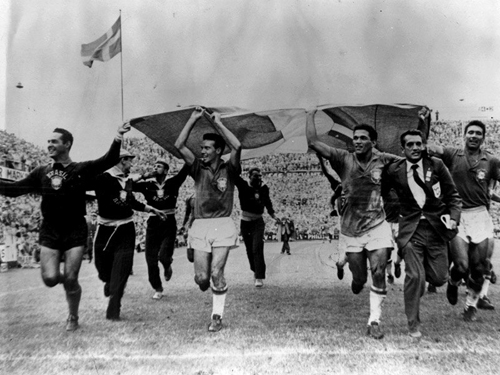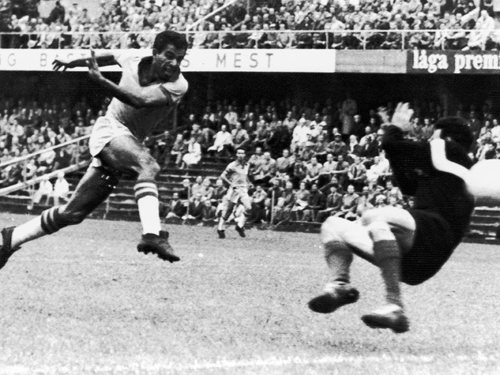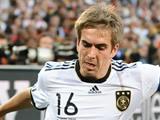The 6th 1958 World Cup, Sweden
The long, sun-kissed days of a Swedish summer provided a golden backdrop to Brazil's first FIFA World Cup™ triumph in 1958, the year that a 17-year-old called Pele announced his presence to football fans around the globe.
With a newfound tactical organisation and two supreme attacking talents in Pele and Garrincha, Brazil beat Sweden 5-2 in the Final at the Rasunda Stadium to become the first team to capture the trophy on a different continent. The Brazilians were not the only heroes: France forward Just Fontaine set a record that stands to this day by scoring 13 times in six matches to help his country claim third place. Not bad for a player only starting because of an injury to first-choice Rene Bliard.

Under coach Vincente Feola, Brazil had left no stone unturned in readying themselves for the challenge of finally conquering the world. After three months' intensive preparations, they toured Europe in advance of the finals and arrived in Sweden with an extensive entourage that included a psychologist. Lining up in an innovative 4-2-4 system, Brazil did not call on either Pele or Garrincha until their final group game against the Soviet Union. Then, with Pele joining Vava in the attack and Garrincha taking up position on the flank, they won 2-0 to secure first place. Brazil had taken flight and Pele's first FIFA World Cup goal followed soon after in the quarter-final victory over Wales.
Hosts Sweden went into the finals boosted by the decision to allow professional footballers to play in the national team: this spelt the return of Italian-based exiles, notably Gunnar Gren and Nils Liedholm, stars of the team who had won the 1948 Olympic Football Tournament, and young goalscoring winger Kurt Hamrin. Yet their preparations were nothing like Brazil's - indeed Bengt Gustavsson, another of the Italian contingent, joined the squad just three days before their opening game.

Swedish cheer
The spirit was strong in Englishman George Raynor's Sweden squad but expectations low; after topping their group, some players packed their suitcases prior to the quarter-final against the Soviet Union. Yet they beat the Soviets and then overcame West Germany 3-1 in a Gothenburg semi-final. Sepp Herberger's German team featured the six-goal Uwe Rahn and Uwe Seeler, making the first five of his record 21 consecutive FIFA World Cup appearances. They were unhappy losers, upset by the flag-waving Swedish cheerleaders who - contrary to previous practice - maintained a chorus of support at pitchside throughout the match.
For the first time the FIFA World Cup received international television coverage, albeit not in eastern Europe because the system there was incompatible - a pity for the Soviet Union who were one of three new names alongside Wales and a Northern Ireland team who had qualified at the expense of Italy. With England and Scotland also present all four British home nations were involved for the first and so far only time. English hopes had been dented by the loss of several key players in the Munich air crash that February and though they held Brazil to a goalless draw - the first in the tournament's history - they lost a play-off for a quarter-final place with the Soviets, after finishing level on points.
Wales and Northern Ireland won their own first-round play-offs against Hungary and Czechoslovakia respectively. The Welsh had qualified for Sweden fortuitously - runners-up in their group, they were the lucky losers drawn to contest a play-off against Israel, whose own opponents had all withdrawn for political reasons. They took this lifeline and, despite the absence of the injured John Charles, went on to run Brazil close in the last eight before Pele's deflected goal.

Free-scoring French
Having disposed of a Hungary side shorn of exiled stars like Ferenc Puskas and Sandor Kocsis, Northern Ireland went down to France in the quarter-finals. With Fontaine feeding off the creative brilliance of fellow forward Raymond Kopa, a newly crowned European champion with Real Madrid and that year's European Footballer of the Year, Les Bleus outscored even Brazil with 23 goals.
France's semi-final against Brazil proved the game of the tournament. Although Fontaine equalised Vava's early opener, a second Brazil goal from Didi ensured the South Americans a half-time lead. After the break Pele took over, his hat-trick inflicting a 5-2 defeat on rivals reduced to ten men by an injury to defender Bob Jonquet.
Brazil, now sporting hastily-acquired blue shirts to avoid a clash with the home team, struck another five in the Final, shrugging aside the setback of Liedholm's early opener for the Swedes. Vava and Pele - with two apiece - and Mario Zagallo, later a world champion as coach, all found the net. None was better than their third, Pele lobbing a defender before volleying the dropping ball past goalkeeper Karl Svensson. Brazil had already won the hearts of the home nation with their off-field friendliness and now they celebrated by parading a Swedish flag around the pitch. They also received the congratulations of King Gustav IV - royal approval for a victory sealed by a tearful teenager they would soon also call 'The King'.
| Teams: | 16 |
| When: | 08 June 1958 to 29 June 1958 |
| Final: | 29 June 1958 |
| Matches: | 35 |
| Goals Scored: | 126 (Avg 3.6 per match) |
| Attendance: | 919,580 (Avg 26,273) |
| Winner: | Brazil |
| Runners-Up: | Sweden |
| Third: | France |
| Fourth: | Germany FR |
| Golden Shoe: | 1: Just FONTAINE (FRA) 2: PELE (BRA) 2: Helmut RAHN (GER) |

Legends pay tribute to Gerrard & Lahm
International retirements follow Wo...
- Year
- Winner
- Runner-up
- Third place
